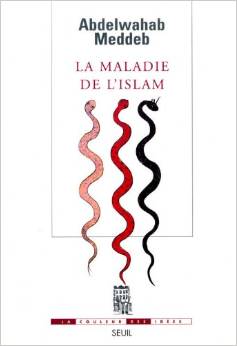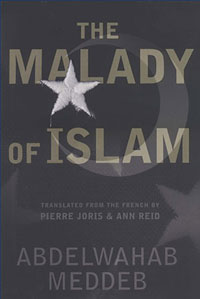The Malady of Islam
by Abdelwahab Meddeb
translated from the French by
Pierre Joris and Charlotte Mandell
(18th installment)
P a r t I V
The Western Exclusion of Islam
33
Now that I’ve come to the end of this book, written in urgency, I would like to enrich the “testimonies against intolerance” collected by Voltaire to form the fifteenth chapter of his Traité sur la tolérance with two verses from the Koran:
No coercion in religion.[1]
Râzî comments on this: the interpretation (ta’wîl) of this sentence is that God did not construct the question of faith on force (ijbâr) and violence (qasr), but based it on the possibility of persuasion (tamakkun) and free choice (ikhtiyâr). God made clear and obvious the path that leads to faith. When all the ways to convince are exhausted in the Book, only coercion remains to lead the hesitant to the truth. But recourse to constraint is unacceptable: the use of violence annuls the testing (imtihân) and effort prompted by assiduous application (taklîf) of the rules. To illustrate the line of argument he borrows from a previous authority (al-Qaffâl), Râzi cites other Koranic verses: “May he who wants to, believe, and may he wants to, remain unbelieving;” “If your Lord had wanted it, all those who people the Earth would believe. Is it up to you to force people to believe?”[2] Râzi recalls that constraint is exercised as soon as the Muslim says to the unbeliever: “Convert or I kill you.” This verse sheds light on the right of the people of the Book and of the Manicheans. If they agree to pay the tax on minorities (jizya), they earn the protection of the law. Legal advisors (fuqahâ’) differ in their opinions as to whether this verse applies to all the unbelievers, or only the people of the Book.[3] In any case, the interpretation of this verse authorizes some metaphysicians or theologians of Islam to suspend the notion of jihad.
And here is the second verse:
Discuss with people of the Book only in the finest manner — except with those among them who are unrighteous. Say: “We believe in what was revealed to us and in what was revealed to you. Our God as well as yours is unique. To him we submit.”[4]
Such a verse is explicit enough; it gives Islam an absolute legitimacy to belong to the ethical and metaphysical sphere of monotheism, which should be expressed by the notion of Islamic-Judeo-Christianity. Allah is not the name of the God of Islam; it is the Arab word that designates God, the same God that is at the basis of monotheism in its formal, cultural, and symbolic ternary variety. The power of this verse imposed the peaceful way on the fundamentalist Mawdûdi, the way of civility implied by the courtesy of persuasion and recourse to words as opposed to weapons; this peaceful recommendation was of course rejected by his successors.[5] The expression bi’llatî hiya ahsan, which I have translated as “in the finest manner,” becomes an idiomatic phrase in Arabic, and is amply used in current language to signify respect for courtesy in any dispute or controversy.
It is this aspect of the Qur’an of which the fanatics of Islam, sick with their suicidal fervor full of hatred, should be reminded. Several times we have evoked Voltaire, who calls for good sense. The master from Ferney calls on reason, which he conceives as the radical remedy against the mental sickness of fanaticism. I would like to confirm this recourse to reason to restrain the monotheists’ summons to the sickness of intolerance and war in the name of God. Renan too invokes reason as remedy for evil:
…If religions divide men, reason brings them closer (…) There is only one single reason. The unity of the human spirit is the great, consoling result that comes from the peaceful clash of ideas, when one puts aside the opposing claims of so-called supernatural revelations. The covenant of the good minds of the whole Earth against fanaticism and superstition is on the surface the act of an imperceptible minority; at bottom, it is the only covenant that lasts…[6]
For the sake of this thought, I pardon his racism, his essentialist vision of languages and symbolic systems, his hierarchy of expression and imagination; I pardon his wanderings of another era, for he also helped me to understand the chimera represented by Pan-Arabism as well as by Pan-Islamism. His pamphlet Qu’est-ce qu’une nation? [What is a nation?] reminded me that the nation is founded not on linguistic unity, not on the community of faith or on geographical continuity or the sharing of history. It is based on the single wish to be together.[7] It is this wish that made me choose the French community, where my foreign name is pronounced with sounds amputated, where I continue to maintain my Islamic genealogy and to cross it with my other, European genealogy. Thus the inherited and the chosen are combined inside one single being.
And as much as I work to make manifest Islamic allusion in my poetic and literary work as well as in my teaching or my presence in the heart of the city, I am still surprised by those who, invoking their Islam, demand that the Republic change, as the representative of about thirty Islamic associations suggests:
…Just as Islam is asked to change, so should secularity change, for today secularity cannot be content with a definition according to which it restricts the religious to the private sphere. The return of the religious is general, and it questions the whole social sphere.[8]
To this unreasonable claim, I will answer with a Talmudic precept that should serve as a teaching for the recognition of the Islamic presence in France: Dina dé-malkhuta dina: “The law of the State takes precedence over the law of the Torah.”[9]
Finally, I would like to take a definitive stance as coming from the solidarity of the community, as an instinctual reflex, a principle of survival and existing, and would recall the old precept that Eratosthenes taught Alexander: disapproving of the division of humanity into Greeks and Barbarians, the former as friends and the latter as enemies, he urges changing the criterion so as to distinguish instead between virtue and dishonesty: “Many Greeks are base people, and many Barbarians have a refined civilization…”[10] And I am happy to find an Islamic formulation of this precept, the echo of which I grasp from the pen of the divine Ibn ‘Arabi:
How many beloved saints there are in the synagogues and churches!
How many enemies full of hatred in the rows of mosques![11]
Paris-Damascus,
October 19-December 9, 2001.
[1] Qur’an, 2:256.
[2] Qur’an, 18:29 and 9:99.
[3] Fakhr ad-Dîn Râzi, Mafâtîh al-Ghayb, 7:13-14.
[4] Qur’an, 29:46.
[5] Emilio Platti, Islam… étrange?, 282-3.
[6] Ernest Renan, “L’Islamisme et la science,” in Discours et conférences (Paris: Calmann-Lévy, 1919), 402-3; Appendix (Response to Afghâni), Journal des débats, May 18, 1883.
[7] Ernest Renan, Qu’est-ce qu’une nation? (Paris: Imprimerie nationale, 1996).
[8] Fouad Alaoui, Libération, October 16, 2001.
[9] Literally: “The law of the country is the law.”
[10] Strabo, Geography, translated into French by Germaine Aujac (Paris: Belles Lettres, 1969), 1:3,9.
[12] Ibn ‘Arabi, At-Tajalliyât al-Ilâhiya (Tehran: Osman Yahia, 1988), 458.
[to be continued with Afterword: War Chronicles]



 Poasis II: Selected Poems 2000-2024
Poasis II: Selected Poems 2000-2024 “Todesguge/Deathfugue”
“Todesguge/Deathfugue” “Interglacial Narrows (Poems 1915-2021)”
“Interglacial Narrows (Poems 1915-2021)” “Always the Many, Never the One: Conversations In-between, with Florent Toniello”
“Always the Many, Never the One: Conversations In-between, with Florent Toniello” “Conversations in the Pyrenees”
“Conversations in the Pyrenees” “A Voice Full of Cities: The Collected Essays of Robert Kelly.” Edited by Pierre Joris & Peter Cockelbergh
“A Voice Full of Cities: The Collected Essays of Robert Kelly.” Edited by Pierre Joris & Peter Cockelbergh “An American Suite” (Poems) —Inpatient Press
“An American Suite” (Poems) —Inpatient Press “Arabia (not so) Deserta” : Essays on Maghrebi & Mashreqi Writing & Culture
“Arabia (not so) Deserta” : Essays on Maghrebi & Mashreqi Writing & Culture “Barzakh” (Poems 2000-2012)
“Barzakh” (Poems 2000-2012) “Fox-trails, -tales & -trots”
“Fox-trails, -tales & -trots” “The Agony of I.B.” — A play. Editions PHI & TNL 2016
“The Agony of I.B.” — A play. Editions PHI & TNL 2016 “The Book of U / Le livre des cormorans”
“The Book of U / Le livre des cormorans” “Memory Rose Into Threshold Speech: The Collected Earlier Poetry of Paul Celan”
“Memory Rose Into Threshold Speech: The Collected Earlier Poetry of Paul Celan” “Paul Celan, Microliths They Are, Little Stones”
“Paul Celan, Microliths They Are, Little Stones” “Paul Celan: Breathturn into Timestead-The Collected Later Poetry.” Translated & with commentary by Pierre Joris. Farrar, Straus & Giroux
“Paul Celan: Breathturn into Timestead-The Collected Later Poetry.” Translated & with commentary by Pierre Joris. Farrar, Straus & Giroux
A great and instructional read, superbly translated by Pierre Joris and Charlotte Mandell. Many thanks.
“If you want to build a ship, don’t drum up people together to collect wood and don’t assign them tasks and work, but rather teach them to long for the endless immensity of the sea.”…Antoine de Saint-Exupery